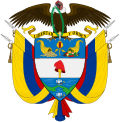This article relies largely or entirely on a single source .(July 2025) |
| This article is part of a series on the |
| Politics of Colombia |
|---|
 |
The People's Will Movement (Movimiento Voluntad Popular) [1] is a political party in Colombia. At the 2002 Colombian parliamentary election, the party won, as one of the many small parties, parliamentary representation.